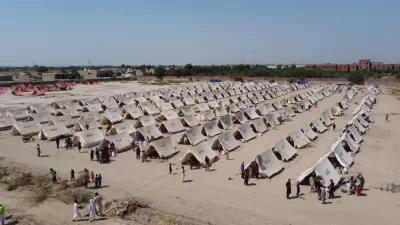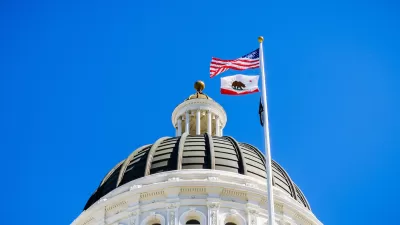Negotiators at this year’s COP27 climate change meetings can claim progress on some tricky issues, but stagnation reigns on the fundamental issue of emission reductions.

The latest round of United Nations climate talks, COP27, ended over the weekend, two days later than originally planned, with a mixed bag to show for the effort. While a deal was brokered on one of the “thorniest” issues facing nations—how to pay for the damages of climate change—the talks failed to achieve substantive progress on emission reductions.
Multiple national and international outlets reported on the conclusion of COP27, including the Associated Press, Reuters, and Vox. None of the media coverage emerging from COP27 flinches from the lack of tangible progress of emission reductions included in the Sharm el-Sheikh Implementation Plan.
United Nations Climate Change also released a press release focusing specifically on the creation of a “loss and damage” fund for vulnerable countries. “Governments took the ground-breaking decision to establish new funding arrangements, as well as a dedicated fund, to assist developing countries in responding to loss and damage. Governments also agreed to establish a ‘transitional committee’ to make recommendations on how to operationalize both the new funding arrangements and the fund at COP28 next year. The first meeting of the transitional committee is expected to take place before the end of March 2023,” according to the press release.
“Parties also agreed on the institutional arrangements to operationalize the Santiago Network for Loss and Damage, to catalyze technical assistance to developing countries that are particularly vulnerable to the adverse effects of climate change.”
The legacy of COP27 will be known officially as the Sharm el-Sheikh Implementation Plan. The plan assumes that a global transformation to a low-carbon economy will require an annual investment of $4-6 trillion. “New pledges, totaling more than USD 230 million, were made to the Adaptation Fund at COP27. These pledges will help many more vulnerable communities adapt to climate change through concrete adaptation solutions,” according to the press release.
FULL STORY: COP27 Reaches Breakthrough Agreement on New “Loss and Damage” Fund for Vulnerable Countries

Alabama: Trump Terminates Settlements for Black Communities Harmed By Raw Sewage
Trump deemed the landmark civil rights agreement “illegal DEI and environmental justice policy.”

Planetizen Federal Action Tracker
A weekly monitor of how Trump’s orders and actions are impacting planners and planning in America.

Why Should We Subsidize Public Transportation?
Many public transit agencies face financial stress due to rising costs, declining fare revenue, and declining subsidies. Transit advocates must provide a strong business case for increasing public transit funding.

Understanding Road Diets
An explainer from Momentum highlights the advantages of reducing vehicle lanes in favor of more bike, transit, and pedestrian infrastructure.

New California Law Regulates Warehouse Pollution
A new law tightens building and emissions regulations for large distribution warehouses to mitigate air pollution and traffic in surrounding communities.

Phoenix Announces Opening Date for Light Rail Extension
The South Central extension will connect South Phoenix to downtown and other major hubs starting on June 7.
Urban Design for Planners 1: Software Tools
This six-course series explores essential urban design concepts using open source software and equips planners with the tools they need to participate fully in the urban design process.
Planning for Universal Design
Learn the tools for implementing Universal Design in planning regulations.
Caltrans
Smith Gee Studio
Institute for Housing and Urban Development Studies (IHS)
City of Grandview
Harvard GSD Executive Education
Toledo-Lucas County Plan Commissions
Salt Lake City
NYU Wagner Graduate School of Public Service





























